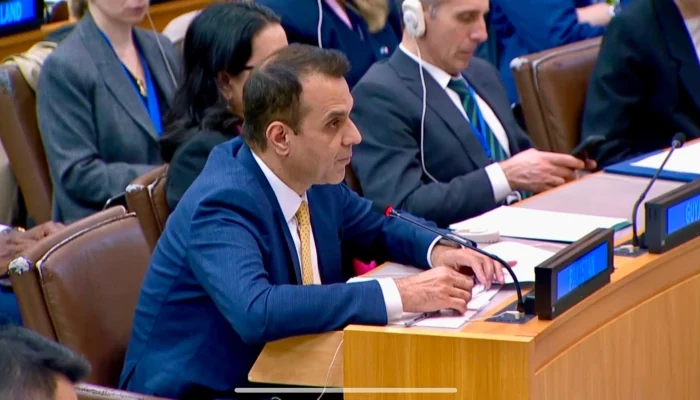A senior Pakistani diplomat has strongly condemned India’s “malevolent designs” to obstruct the water flow guaranteed to Pakistan under the 1960 Indus Waters Treaty. He urged New Delhi to refrain from impeding, diverting, or restricting rivers that flow downstream into Pakistan.
Ambassador Usman Jadoon, Pakistan’s Deputy Permanent Representative to the UN, addressing the United Nations Security Council (UNSC)’s Arria Formula Meeting on ‘Protecting Water in Armed Conflict’, underscored India’s attempt to weaponize water, stating, “We will never accept any such moves.”
Arria Formula meetings are informal sessions designed to facilitate frank and private discussions among Security Council members on pertinent subjects.
The 15-member Council’s meeting on ‘Protecting Water in Armed Conflict’ was convened by Slovenia, in collaboration with Algeria, Panama, Sierra Leone, and the Global Alliance to Spare Water from Armed Conflicts.
Opening the debate, Slovenia’s State Secretary Melita Gabric emphasized the crucial role of protecting water and related infrastructure during armed conflicts to safeguard civilian lives, asserting: “Protection of civilians and civilian objects under international humanitarian law is non-negotiable.”
The UNSC forum held this discussion on safeguarding water infrastructure in response to New Delhi’s threats to curtail Islamabad’s water supply. Following the deadly April attack on tourists in Indian Illegally Occupied Jammu and Kashmir’s (IIOJK) Pahalgam, which India attributes to Islamabad, New Delhi “put in abeyance” its participation in the 1960 Indus Waters Treaty.
Pakistan has refuted any involvement in the incident, yet the accord remains suspended despite the two nuclear-armed neighbors agreeing to a ceasefire earlier this month after their most intense fighting in decades.
In his remarks, the Pakistani envoy highlighted that attacks against water resources, associated infrastructure, and denial of access to these vital resources constitute a blatant violation of established norms and universally accepted principles. He noted that the UNSC has also reaffirmed these principles and strongly condemned the unlawful denial of such access and the deprivation of civilians of objects essential for their survival.
“India’s decision to illegally and unilaterally suspend the 1960 Indus Waters Treaty (IWT), aiming to impede the flow of water guaranteed to Pakistan under the Treaty, is a grave violation of international law, including human rights law, treaty law, and customary international law,” Ambassador Jadoon asserted.
He further commented, “Troubling pronouncements by Indian leadership to ‘starve the people of Pakistan’ depict a highly dangerous and perverse thinking.”
“We strongly condemn India’s unlawful announcement to hold the Treaty in abeyance and call upon India to strictly abide by its legal obligations and refrain from stopping, diverting or restricting rivers that are a lifeline for 240 million people of Pakistan.”
He urged the UNSC to intervene by identifying situations where violations of international law, including International Humanitarian Law (IHL) principles, could jeopardize peace and security or lead to a catastrophic humanitarian crisis, and to act preventively.
In conclusion, Ambassador Jadoon reiterated calls for full compliance with IHL and international human rights laws, particularly concerning the protection of water resources and their associated infrastructure.



